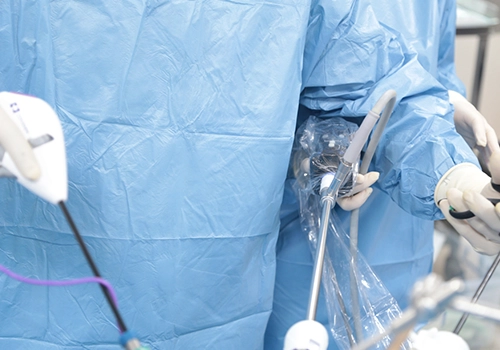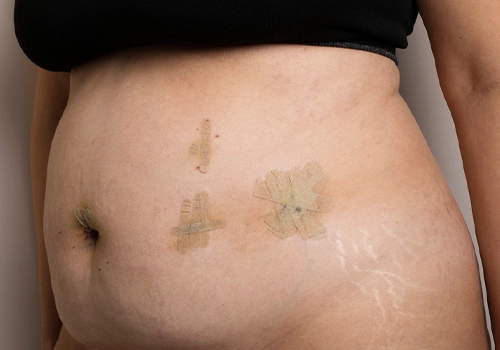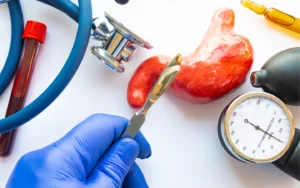Transformative Journeys: Exploring the Impact of Gastric Sleeve Surgery on Weight Loss and Health
Overweight people benefit from Gastric sleeve surgery. “Gastric sleeves” reduce stomachs. Gastric sleeve reduce weight. This magic can slim your stomach. “Gastrectomy” removes the stomach entirely or partially. A Gastric sleeve removes 80% of the stomach. Post-op stomachs are banana tubes!
Gastric sleeves help obese people. To shrink the stomach, physicians remove tissue. Smaller stomachs make people feel full faster and eat less. Enjoyment accelerates. Hunger hormones fall. Reduced appetite and snacking may help people lose weight with this technology.
Discover the transformative benefits of Gastric Sleeve Surgery tailored for overweight individuals at Dr. Maadico’s Cosmetic Department in Iran. Choose Dr. Maadico’s expertise for a personalized and comprehensive approach to achieving a healthier, slimmer you. Your transformative weight loss journey begins here!
Candidate for Gastric sleeve
Stomach sleeves aid overweight people. Not everyone can receive this treatment.
- Special needs apply to Gastric sleeve surgery like BMI greater than 40 and Third-class obesity. Weight and height define BMI. It helps us determine a healthy weight.
- Mental and physical preparation is needed for surgery and recuperation. Before weight-loss surgery, consult professionals. psychologists, dieticians, and doctors. our health is assessed before surgery.
Many crucial factors precede Gastric sleeve surgery. Share your reasons for surgery with your doctor.
Diseases Targeted by Gastric Sleeve
Weight loss surgery helps overweight people. The treatment targets obesity-related diseases. Only approved applicants can join this special program. They must have considerable obesity-related medical conditions or be at high risk. The approach promotes health and addresses numerous ailments. Among these diseases are:
- Diabetes type 2 and insulin resistance
- Hypertension and heart disease
- hyperlipidemia—high cholesterol—arterial disease
- NAFLD and Steatohepatitis
- Obesity affects breathing and sleep

What is a Gastric sleeve?
Specialists perform Gastric sleeve surgery. Advanced technology removes stomach tissue using small incisions and The rest becomes sleeves.
Gastric sleeve happens with the help of laparoscopic or robotic sleeve gastrectomy. To reach the organs, your doctor will cut your stomach. Open surgery can happen. Choosing Open or laparoscopic surgery and recovery time depend on health.
A general anesthetic lets you sleep through an operation. Sleeve gastrectomy is faster and simpler than other weight-loss surgeries. It lasts 1 hour to 30 minutes. One to two days after surgery, the surgeon may prescribe hospitalization. This helps doctors and nurses treat post-op nausea and pain.
Preparation
Bariatric sleeve surgery follows, if eligible. We recommend a two-week liquid diet. A surgeon will give special instructions. For safety, we want to lose belly and liver fat.
Eat and drink nothing for 12 hours before the operation. Fasting is required. Surgery requires an empty stomach. Leftover food or drink could be deadly.
The surgery
Surgery will slice your belly properly. Cutting is around 1/2 inch! The surgeon carefully inserts the port and injects carbon dioxide into the stomach.
Doctors gently insert illuminated laparoscopes. Body cameras can reveal your body on enormous screens.
One to three more cuts by surgeons will made. Long, thin tools are surgically added.
Previously, doctors measured the Gastric sleeve extensively. Surgery staples separate your stomach.
A considerable piece of the stomach is meticulously removed by the surgeon, usually along the greater curvature. The remaining stomach is molded into a sleeve-like structure, which reduces its capacity.
Stitches or staples are used to seal the incisions. Absorb able sutures or skin glue may be utilized in some circumstances. Gastric sleeve surgery takes 1-2 hours.
Opting for Gastric sleeve surgery in Tehran presents a practical choice for weight loss, providing an affordable solution that can markedly enhance the quality of life for patients.

Recovery and Post-Operative Care
Healing takes time after surgery.
Patients are watched in a recovery area following surgery before being transported to a hospital room. They are often given pain medication and begin a diet progression. Most patients are admitted to the hospital for a few days.
In the coming weeks and months, doctor visits will grow. doctors and nurses will track your weight loss, health, and post-surgery changes. They will also ask about weight loss and wellness. Gastric sleeve surgery requires a special diet.
Diet after Gastric sleeve
Following Gastric sleeve surgery, it is critical to adhere to a certain diet to improve healing, adjust to the smaller stomach size, and achieve successful weight loss. Remember that dietary recommendations may differ amongst healthcare practitioners, and individuals should always follow their surgeon’s instructions. The following is a general summary of the dietary stages that are commonly recommended following a Gastric sleeve procedure:
- Clear Liquid Diet (First Few Days):
To allow the stomach to recover, the first few days after the Gastric sleeve is frequently spent on a clear liquid diet. Water, broth, clear fruit juices, and sugar-free gelatin may be included.
Slowly sip beverages and avoid using straws, which might introduce air into the stomach.
- complete Liquid Diet (In the Coming Days):
Gradually transition to complete liquids, such as protein drinks, yogurt, and strained soups.
It is critical to prioritize protein intake to help recovery and prevent muscle loss.
- Pureed or Blended Diet (Weeks 2-4):
Begin introducing pureed or blended foods such as baby food, cottage cheese, and well-cooked vegetables.
To avoid irritation to the healing stomach, make sure the consistency is smooth.

- Soft Diet (Weeks 5-6):
Switch to foods that are soft and easy to chew, such as scrambled eggs, ground meat, and cooked vegetables.
Maintain a high protein intake while avoiding tough or fibrous foods.
- Regular Diet (After Week 6):
Many people can begin reintroducing a regular, well-balanced diet at this point.
To assist digestion, eat lean proteins, healthy grains, fruits, and vegetables, and chew your food thoroughly.
Avoid foods and beverages that are high in calories but lacking in nutrients.
Success Hints
- Protein Intake:
Protein is important for healing, maintaining muscular mass, and promoting satiety. Lean meats, poultry, fish, eggs, dairy, and plant-based protein sources are examples of protein-rich foods.
- Stay hydrated by drinking water between meals.
Drinking significant amounts of drinks with meals might cause pain and decrease the feeling of fullness.
- Portion control
Portion control is important because the stomach’s capacity is drastically reduced following surgery. It can be helpful to eat small, frequent meals throughout the day.
- Vitamin and mineral
Vitamin and mineral supplements, such as calcium, vitamin B12, and iron, may be recommended by healthcare practitioners based on individual needs.
- Slowly Introduce New Meals
Introduce new meals gradually and notice how your body reacts. Some foods may be tolerated better than others.
Working together with a healthcare practitioner or a registered dietitian who specializes in bariatric nutrition to develop an individualized food plan tailored to your specific needs and success is critical. Following Gastric sleeve surgery, regular follow-up checkups and continuing assistance are critical for long-term success.

Benefits
The Gastric sleeve is faster, safer, and simpler than many bariatric operations. Patients with health issues that limit treatment can have a sleeve gastrectomy. Since the procedure doesn’t modify your intestines, your diet won’t change.
Dangers
Consider potential problems.
Large or small, all surgeries have complications. Sleeve gastrectomy complications affect less than 1%. The consequences of surgery are being studied!
- bleeding
- infections
- anesthesia issues
- leakage
- Malnutrition: Little eating makes it harder to absorb enough nutrients, generating shortages. Patients undergoing Bariatric surgery must take vitamins and minerals daily.
- Reflux: After surgery, acid reflux may worsen. Drugs can assist.
- Gallstones: Fast weight reduction raises gallstone risk. Some foods’ fat strains the liver. This fat can cause gallbladder and cholesterol stones. After eating, these stones hurt. you may need another gallbladder removed or Cholecystectomy.
Some surgical patients struggle long-term. Easy treatment is typical.
Outlook
Gastric sleeve surgery recovery varies. Healing takes time. Some recover in weeks, some later. Take your doctor’s advice to heal. As calories decrease, people may become weary.Just liquids at the beginning. Slowly add solids and a moderate diet. Sleeve Gastric surgery decreases weight. Each person loses weight differently. Exercise and good nutrition help.
Expect 1–2 years of 25%–30% weight loss. After surgery, daily routines affect weight reduction. Some behaviors help lose weight; others impede. Losing weight requires a healthy lifestyle. Weight gain is possible. People lose 25%–30% of their weight in five years.
In this context, Dr. Maadico’s expert guidance ensures a personalized approach, bringing you closer to a healthier and more confident version of yourself. if you are considering having Gastric Sleeve surgery and want to make sure whether you are a good candidate or not, simply consult with our specialists at Dr. Maadico’s Cosmetic Department.
If you’re ready for a change, request a free consultation.
You may also be interested in knowing about:
Weight Loss with Mini Gastric Bypass
Bariatric Gastric Bypass
Intragastric Balloon
Lap-Band Surgery
Laparoscopic Gastric Plication
FAQs
- How long does a Gastric sleeve last?
Gastric sleeve surgery is a permanent procedure. the success and longevity of the weight loss achieved through the surgery depend on various factors, including adherence to dietary recommendations, lifestyle choices, and overall health.
- Can you eat normally after the Gastric sleeve?
Following a Gastric sleeve surgery, the eating pattern needs to be adjusted. Initially, patients follow a specific diet progression that starts with clear liquids and gradually transitions to solid foods over several weeks. While the stomach’s capacity is reduced, individuals can eventually eat a regular, well-balanced diet, but portion control and food choices are crucial.
- Can I gain weight after the Gastric sleeve?
Yes. While Gastric sleeve surgery is an effective tool for weight loss, long-term success depends on the individual’s commitment to a healthy lifestyle.
- How painful is the Gastric sleeve?
Gastric sleeve surgery is performed under general anesthesia, meaning patients are asleep during the operation and should not experience pain. After the surgery, there may be some discomfort, and pain medication is typically prescribed to manage any post-operative pain.
- Is the Gastric sleeve processor available in Iran?
Yes, the essay mentions that opting for Gastric sleeve surgery in Tehran, Iran, presents a practical choice for weight loss, providing an affordable solution that can markedly enhance the quality of life for patients. It implies that the Gastric sleeve procedure is indeed available in Iran.


